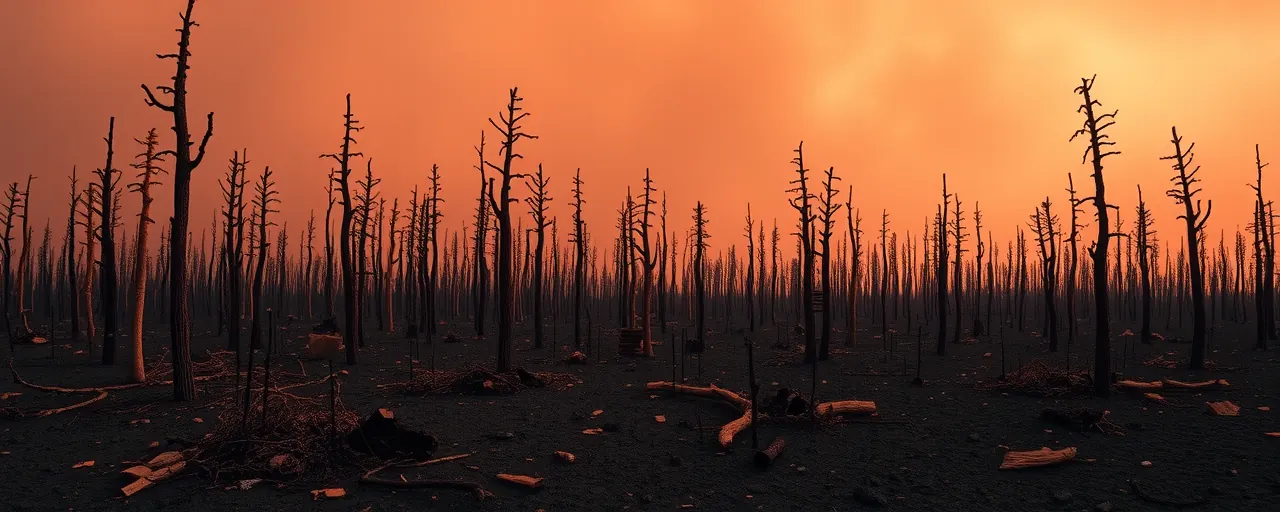A Deadly Haze Claims Lives
Thick wildfire smoke blankets California, choking cities and towns. For most, it means irritation—itchy eyes, a nagging cough, a day spent indoors. For lung cancer patients, it’s far worse. A recent study of over 18,000 Californians diagnosed between 2017 and 2020 found that wildfire smoke exposure raises mortality by 20%. Some patients, particularly those with advanced cancer who never smoked, face a 55% higher risk of death. This crisis demands action, yet we’re still standing still.
The culprit is fine particulate matter, or PM2.5, tiny particles in smoke that burrow into the lungs. They spark inflammation and stress in the body, hitting cancer patients hardest. Those with stage IV disease struggle most, their weakened systems unable to cope. Why do we accept this as normal? The study’s findings aren’t just numbers—they’re lives lost to preventable harm.
Wildfires have become fiercer and more frequent, driven by a 1.2°C rise in global temperatures since the 1800s. Fire seasons in the Western U.S. now last six weeks longer than two decades ago. Climate change fuels these blazes, turning forests into tinderboxes. Ignoring this reality costs lives, especially for those already battling illness.
Protecting Lives With Bold Air Quality Laws
Health experts are clear: we need tougher air quality standards under the Clean Air Act. Tighter PM2.5 limits, expanded air monitoring, and stronger federal-state collaboration can shield communities. Since the 1970s, this law has cut pollution and saved lives. Now, we must apply that same commitment to wildfire smoke, a growing threat to public health.
The impact would extend beyond cancer patients. PM2.5 lingers for months, spiking hospital visits for heart attacks, strokes, and asthma. Low-income and minority neighborhoods, often near fire-prone or industrial areas, suffer most. Justice requires directing resources to these communities, ensuring they have clean air and safe spaces during smoke events.
Public health investments are critical. Hospitals need advanced air filtration, and cities should adopt urban designs that reduce heat and pollution. The Inflation Reduction Act has allocated $15 billion for wildfire resilience, but more funding is needed to weave climate health into medical care and emergency systems. Every step forward saves lives.
Why Industry’s Approach Falls Short
Some industry leaders argue for ‘treatment resilience’—improving medical care for smoke-related illnesses—over stricter air quality rules. They blame wildfires on overgrown forests, downplaying climate change’s role. While decades of fire suppression have left fuels piled up, it’s rising temperatures and droughts that ignite these massive blazes. Denying this ignores the science.
Focusing on treatment alone fails to prevent harm. Immunotherapy, which helped some patients during smoke events, isn’t a fix for everyone. PM2.5 causes lasting inflammation and immune issues, making prevention essential. Relying on medical solutions after exposure is like mopping the floor during a flood—it doesn’t stop the damage.
Industry’s push for regulatory rollbacks, like the Fix Our Forests Act, prioritizes profit over people. These policies weaken environmental protections under the guise of streamlining forest management. Supporters claim air quality rules burden businesses, but who pays the real cost? Not corporations, but communities breathing toxic air, especially those with the least resources.
A Call for Action and Equity
The evidence is undeniable: wildfire smoke is a public health disaster, and lung cancer patients are among its casualties. Strengthening air quality laws, funding resilience, and prioritizing environmental justice are urgent needs. Why should those already suffering bear the weight of our inaction? We have the tools to protect them—let’s use them.
Policymakers must act decisively. The Clean Air Act provides a strong foundation, but it needs bolder standards and enforcement. Cities should expand air quality alerts and ensure residents know how to stay safe during smoke events. Rejecting the false choice between regulation and resilience means embracing both to build a healthier future.
This is about values—whose lives matter and what kind of world we create. Every lung cancer patient lost to wildfire smoke is a reminder of our failure to act. Let’s honor them with bold policies, equitable solutions, and a commitment to clean air for all. The smoke may cloud our skies, but our determination must shine through.
